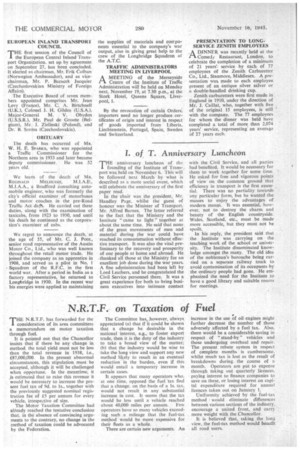N.R.T.F. on Taxation of Fuel T HE N.R.T.F. has forwarded for
Page 20

If you've noticed an error in this article please click here to report it so we can fix it.
the consideration of its area committees a memorandum on motor taxation through fuel.
It is pointed out that the Chancellor insists that if there be any change in method. the total yield must not be less than the total revenue in 1938, i.e., £87,000,000. In the present abnormal circumstances, this stipulation must be accepted, although it will be challenged when opportune. In the meantime, it is estimated that to raise this revenue it would be necessary to increase the, present fuel tax of 9d. to Is., together with the previously suggested nominal registration fee of £5 per annum for every vehicle, irrespective of size.
The Motor Taxation Committee had alteady reached the tentative conclusion that, in the absence of convincing arguments to the contrary, no change in the method of taxation could be advocated by the Federation. The Committee has, however, always appreciated (a) that if it could be shown that a change be desirable in the national interest, e.g., to foster export trade, then it is the duty of the industry to take a broad view of the matter; (b) that the industry would be wise to take the long view and support any new method likely to result in an eventual reduction in the burden, even if this would entail a temporary increase in certain cases.
It appears that many operators who, at one time, opposed the fuel tax find that a change, on the basis of a Is. tax, would not result in any substantial increase in cost. It seems that the tax would be less until a vehicle reached about 40,000 miles per annum. Few operators have so many vehicles exceeding such a mileage that the fuel-tax method would be more expensive for their fleets as a whole.
There are certain new arguments. An
increase in the use 'of oil engines might further decrease the number of those adversely affected by a fuel tax. Also.
• there would be a considerable saving in respect of "stand-by" vehicles and those undergoing overhaul and repair. The present rebate system in respect of complete months is cumbersome, whilst much tax is lost as the result of breakdowns during the course of a month. Operators are put to expense through taking out quarterly licences. paying interest to finance companies to save on these, or losing interest on capital expenditure required for annual licences taken out on January 1.
Uniformity achieved by the fuel-tax method would eliminate differences between various sections of the industry, encourage a united front, and carry more weight with the Chancellor.
It is believed that, taking the long view, the fuel-tax method would benefit all road users.




















































